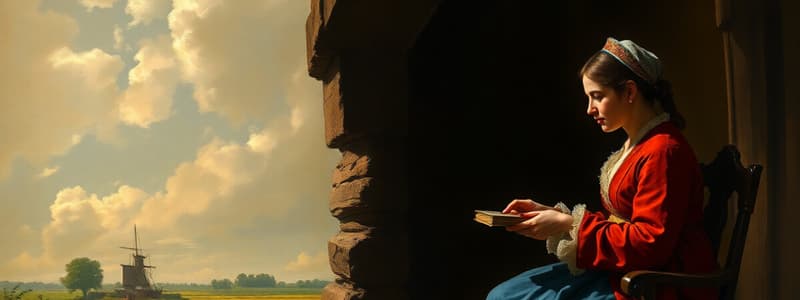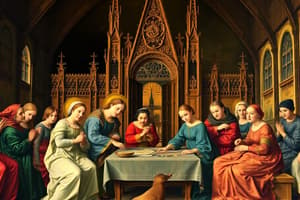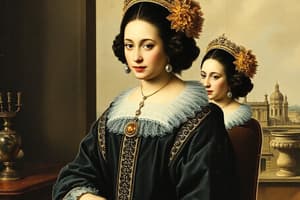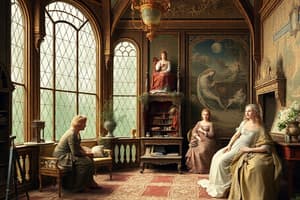Podcast
Questions and Answers
What technique is exemplified by Da Vinci's work that enhances the sculptural qualities of the skin?
What technique is exemplified by Da Vinci's work that enhances the sculptural qualities of the skin?
- Tenebrism
- Sfumato (correct)
- Chiaroscuro
- Impressionism
Which characteristic accurately describes genre painting?
Which characteristic accurately describes genre painting?
- Illustration of everyday life (correct)
- Representing individuals of high social status
- Focus on religious themes
- Depiction of mythological characters
In 'Woman Holding a Balance', what symbolically represents the woman's inner state of mind?
In 'Woman Holding a Balance', what symbolically represents the woman's inner state of mind?
- The alchemy of the paint used
- The balance she holds (correct)
- The background scene of the Last Judgment
- The texture of her cloak
What is a significant aspect of 'Girl with a Pearl Earring' in relation to traditional portraiture?
What is a significant aspect of 'Girl with a Pearl Earring' in relation to traditional portraiture?
What thematic element is explored through Rembrandt's self-portrait?
What thematic element is explored through Rembrandt's self-portrait?
What color palette is primarily used in 'Woman Holding a Balance' to create a sense of balance?
What color palette is primarily used in 'Woman Holding a Balance' to create a sense of balance?
What artistic technique allows subtle transitions between light and dark in oil painting, as seen in 'Girl with a Pearl Earring'?
What artistic technique allows subtle transitions between light and dark in oil painting, as seen in 'Girl with a Pearl Earring'?
Which aspect does NOT characterize Vermeer’s approach to composition in 'Woman Holding a Balance'?
Which aspect does NOT characterize Vermeer’s approach to composition in 'Woman Holding a Balance'?
In Rembrandt's self-portrait, what major life event significantly influenced his artistic output?
In Rembrandt's self-portrait, what major life event significantly influenced his artistic output?
What type of gaze does 'Girl with a Pearl Earring' evoke, making the viewer feel engaged?
What type of gaze does 'Girl with a Pearl Earring' evoke, making the viewer feel engaged?
What is a distinctive characteristic of Johannes Vermeer's paintings?
What is a distinctive characteristic of Johannes Vermeer's paintings?
Which statement best reflects Rembrandt van Rijn's approach to portraiture?
Which statement best reflects Rembrandt van Rijn's approach to portraiture?
What was a major economic factor in the prosperity of the Dutch Republic?
What was a major economic factor in the prosperity of the Dutch Republic?
How did Johannes Vermeer achieve descriptive ambiguity in his artwork?
How did Johannes Vermeer achieve descriptive ambiguity in his artwork?
What aspect of the Dutch Republic's governance contributed to its cultural development?
What aspect of the Dutch Republic's governance contributed to its cultural development?
What concept refers to the manner in which something is depicted and perceived by audiences?
What concept refers to the manner in which something is depicted and perceived by audiences?
Which of the following best describes the typical subject matter of Vermeer's paintings?
Which of the following best describes the typical subject matter of Vermeer's paintings?
What was a significant impact on the distribution of art during the Dutch Republic?
What was a significant impact on the distribution of art during the Dutch Republic?
What role did surplus income from trade play in the Dutch Republic's society?
What role did surplus income from trade play in the Dutch Republic's society?
In what way did Johannes Vermeer and Rembrandt differ in their subject focus?
In what way did Johannes Vermeer and Rembrandt differ in their subject focus?
Flashcards
Systems of Representation
Systems of Representation
A way of representing and perceiving someone or something.
Identity
Identity
The ways in which we understand and express ourselves, including our beliefs, values, and experiences.
Genre Painting
Genre Painting
A type of painting that depicts everyday scenes and activities, often focused on middle-class life.
Complementary Color Palette
Complementary Color Palette
Signup and view all the flashcards
Artistic Visual Expression
Artistic Visual Expression
Signup and view all the flashcards
Portrait
Portrait
Signup and view all the flashcards
Remarkable Depth of Humanity
Remarkable Depth of Humanity
Signup and view all the flashcards
Dutch Republic (1581-1795)
Dutch Republic (1581-1795)
Signup and view all the flashcards
Life Drawing
Life Drawing
Signup and view all the flashcards
Autobiography through Paintings
Autobiography through Paintings
Signup and view all the flashcards
Sfumato
Sfumato
Signup and view all the flashcards
Woman Holding a Balance
Woman Holding a Balance
Signup and view all the flashcards
Girl with a Pearl Earring
Girl with a Pearl Earring
Signup and view all the flashcards
Self-Portrait
Self-Portrait
Signup and view all the flashcards
Tronic
Tronic
Signup and view all the flashcards
Gradation
Gradation
Signup and view all the flashcards
Complementary Colors
Complementary Colors
Signup and view all the flashcards
Rule of Thirds
Rule of Thirds
Signup and view all the flashcards
Study Notes
Johannes Vermeer
- Born in Delft, Netherlands in 1632.
- Created a small but highly regarded body of work, with only 35 paintings known to scholars (out of an estimated 50).
- Enjoyed patronage from a devoted individual who purchased half of his works.
- Supported by his wife and mother-in-law.
- Master of descriptive ambiguity.
- Relatively unknown during his lifetime, with his works remaining in the Netherlands until after his death.
- Specialized in genre paintings, often featuring a single light source and complementary colors (blues and yellows).
- Focused on domestic and interior scenes of middle-class life.
- Art served as visual expressions rather than narrative storytelling.
- Paintings offered intimate glimpses into everyday life.
Rembrandt van Rijn
- Worked across various artistic genres, including landscapes, religious, and historical paintings.
- Talented draftsman.
- Remarkable for depicting profound human qualities with detailed expressions.
- Widely known for his portraits, which portray subjects with a sense of intimacy and affection.
- Portrayed himself frequently.
- Depicted Saint Bartholomew, omitting the sword typically associated with his martyrdom, to humanize the portrayal.
- Self-portraits served as autobiographical statements, reflecting his life through artistic representation.
- Born in the Netherlands.
Dutch Republic (1581-1795)
- Rapidly became a prosperous nation, fueled by trade in timber, cheese, carrots, cauliflower, and tulips.
- Acquired colonies in South America, West Africa (access to sugar), Sri Lanka, and South Asia.
- Powerful empire and dominant economic force, with significant influence in foreign trade (sugar, timber, and slaves).
- Highest per capita income in Europe.
- Produced an immense volume of paintings, distributed through private commissions and a robust trade network.
- Governed by elected citizens, rather than kings or queens.
- Showcased religious tolerance and a large middle class.
Systems of Representation
- Systems of representation are how people and things are depicted and perceived.
- Examples include portraiture, icons, and beauty standards.
- Often overlooked as they are ingrained in daily life.
Identity
- Identity encompasses how people perceive and express themselves.
- May be innate or developed through social interactions.
- Portrayals of humans are commonly used to represent identity.
Portraiture
- Portraiture captures a likeness of an individual.
- Aims to depict the personality of the subject.
Sfumato
- Technique enhancing the sculptural qualities of skin.
- Creates a smoky or hazy effect in paintings.
- Used by Leonardo da Vinci (e.g., Mona Lisa).
Genre Painting
- Depicts people and events from everyday life.
- Usually intended for domestic spaces, not for palace display.
- Reflects the popularity of ordinary life as a subject matter.
Specific Works (Artist, Title, Date, Dimensions [optional], Location)
- Woman Holding a Balance, Johannes Vermeer, c. 1664, 40 x 35 cm, National Gallery of Art, Washington D.C., Widener Collection
- Girl with a Pearl Earring, Johannes Vermeer, 1665, 44 x 39 cm, Mauritshuis, The Hague
- Self-Portrait, Rembrandt van Rijn, 1659, 123 x 104 cm, National Gallery of Art, Washington D.C., Andrew W. Mellon Collection
Studying That Suits You
Use AI to generate personalized quizzes and flashcards to suit your learning preferences.




